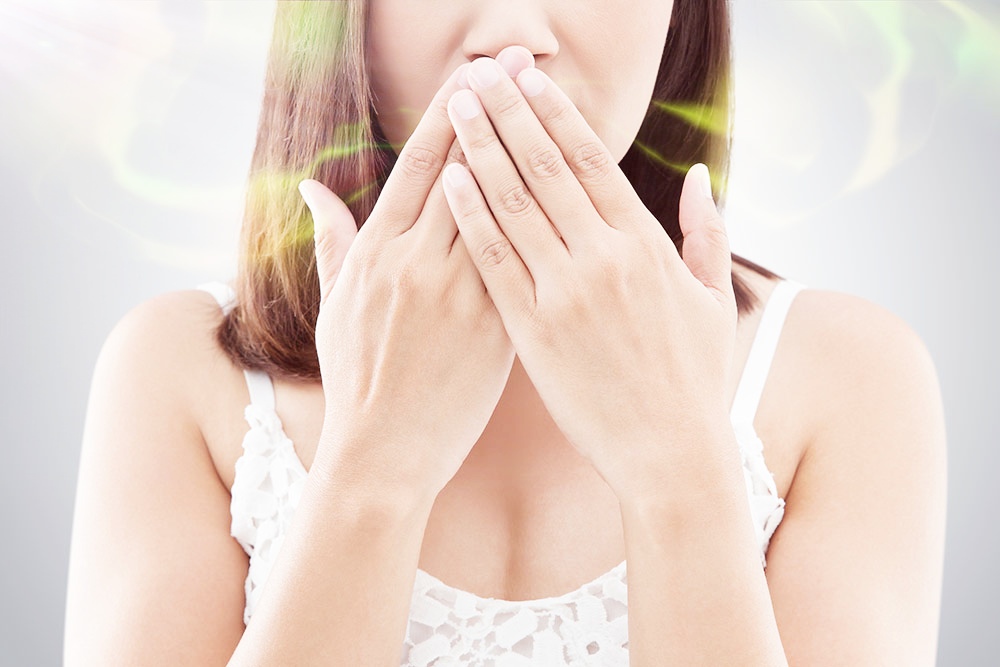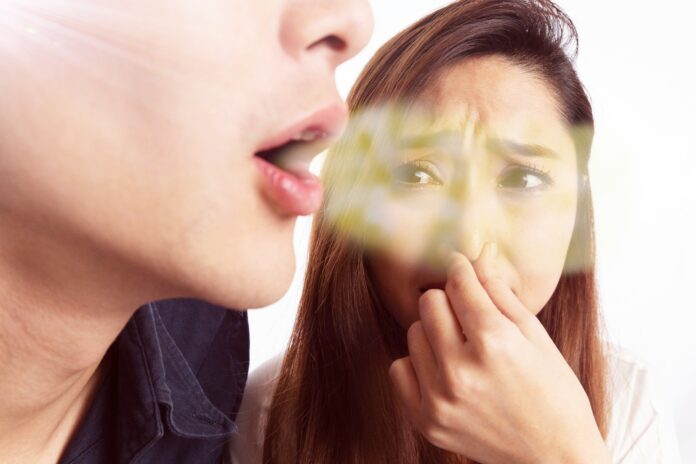
the top 10 causes of bad breath and how to prevent it with home remedies.
Bad breath, medically known as halitosis, is a common condition that can affect people of all ages. It is characterized by an unpleasant odor emanating from the mouth, which can cause embarrassment and social discomfort. In this article, we will explore the
top 10 causes of bad breath and provide home remedies to prevent it.
Poor oral hygiene
The most common cause of bad breath is poor oral hygiene. When food particles and bacteria accumulate in the mouth, they can cause an unpleasant odor. To prevent this, it is essential to brush your teeth twice a day, floss daily, and use mouthwash. You should also replace your toothbrush every three to four months.
Home remedies: Brush your teeth with baking soda and water, which can neutralize odors. Rinse your mouth with saltwater to kill bacteria and freshen your breath.
Dry mouth
A dry mouth, also known as xerostomia, is a condition in which there is insufficient saliva production in the mouth. Saliva helps to neutralize acids and wash away food particles, and its absence can lead to bad breath. A dry mouth can be caused by medications, medical conditions, or breathing through the mouth.
Home remedies: Drink plenty of water to keep your mouth moist. Chew sugarless gum or suck on sugarless candy to stimulate saliva production. Use a humidifier at night to keep your mouth from getting too dry.
Tobacco use
Smoking or using other tobacco products can cause bad breath. Tobacco products leave a distinct odor in the mouth, which can linger for hours.
Home remedies: Quit smoking or using tobacco products. Brush your teeth, tongue, and gums after smoking to remove the odor.
Infections
Infections in the mouth, such as gum disease or tooth decay, can cause bad breath. These infections can produce foul-smelling pus that can emit a strong odor.
Home remedies: Practice good oral hygiene to prevent infections from developing. Use an antibacterial mouthwash to kill bacteria and freshen your breath. See a dentist regularly to monitor your oral health.
Sinus or respiratory infections
Sinus or respiratory infections can also cause bad breath. These infections produce mucus that can drip down the back of the throat, causing an unpleasant odor.
Home remedies: Drink plenty of fluids to help thin out the mucus. Use a saline nasal spray to flush out your sinuses. Use a humidifier to help relieve congestion.
Acid reflux
Acid reflux, also known as gastroesophageal reflux disease (GERD), is a condition in which stomach acid flows back up into the esophagus. This can cause a sour or bitter taste in the mouth, as well as bad breath.
Home remedies: Avoid trigger foods such as spicy or acidic foods, caffeine, and alcohol. Eat smaller, more frequent meals. Don’t lie down after eating.
Diet
Certain foods can cause bad breath, such as garlic, onions, and spicy foods. These foods contain volatile oils that can be absorbed into the bloodstream and carried to the lungs, where they are exhaled.
Home remedies: Brush your teeth and rinse your mouth after eating these foods. Chew sugarless gum or suck on sugarless candy to freshen your breath.
Medications
Certain medications can cause dry mouth, which can lead to bad breath. These medications include antihistamines, diuretics, and some antidepressants.
Home remedies: Drink plenty of water to keep your mouth moist. Chew sugarless gum or suck on sugarless candy to stimulate saliva production.
Medical conditions
Certain medical conditions can cause bad breath, such as diabetes, liver disease, and kidney disease. These conditions produce a distinct odor that can be detected on the breath.
Home remedies: Treat the underlying medical condition to address the bad breath. It is important to see a doctor to diagnose and treat any medical conditions that may be contributing to poor breath.
Stress and anxiety
Stress and anxiety can also cause bad breath. When we are stressed or anxious, we tend to breathe through our mouths, which can cause dry mouth and bad breath.
Home remedies: Practice stress-reducing techniques, such as meditation or deep breathing exercises. Drink plenty of water to keep your mouth moist.
In addition to these top 10 causes of bad breath, some additional factors can contribute to poor breath, such as alcohol consumption and poor diet.
Home remedies

Here are some home remedies that can help prevent and treat bad breath:
Brush and floss regularly
Brush your teeth twice a day and floss at least once a day to remove food particles and bacteria from your mouth.
Use a tongue scraper
Use a tongue scraper to remove bacteria and dead cells from your tongue. This can help prevent bad breath.
Drink plenty of water
Drinking water can help keep your mouth moist and prevent dry mouth, which can lead to bad breath.
Chew sugarless gum or suck on sugarless candy
Chewing gum or sucking on candy can stimulate saliva production, which can help prevent dry mouth and freshen your breath.
Use an antibacterial mouthwash
An antibacterial mouthwash can kill bacteria in your mouth and freshen your breath. Look for a mouthwash that contains chlorhexidine or cetylpyridinium chloride.
Eat a healthy diet
Eating a healthy diet that is rich in fruits and vegetables can help prevent bad breath. Avoid foods that are high in sugar and processed foods.
Use natural remedies
Natural remedies such as chewing on fennel seeds, parsley, or cloves can help freshen your breath. You can also rinse your mouth with apple cider vinegar or baking soda to neutralize odors.
Avoid smoking and using tobacco products
Quitting smoking or using tobacco products can help prevent bad breath.
Manage stress and anxiety
Stress and anxiety can cause bad breath. Managing stress through exercise, meditation, or therapy can help reduce bad breath.
Visit your dentist regularly
Regular dental checkups can help prevent and treat gum disease and tooth decay, which can cause bad breath. Your dentist can also give you advice on how to improve your oral hygiene routine.
In conclusion, bad breath can be caused by a variety of factors, including poor oral hygiene, dry mouth, infections, tobacco use, sinus or respiratory infections, acid reflux, diet, medications, medical conditions, and stress and anxiety. To prevent bad breath, it is important to practice good oral hygiene, drink plenty of water, chew sugarless gum or suck on sugarless candy, use an antibacterial mouthwash, eat a healthy diet, use natural remedies, quit smoking, manage stress and anxiety, and visit your dentist regularly. With these home remedies and lifestyle changes, you can prevent bad breath and improve your oral health.
While home remedies can help you but , it is important to remember that they are not a substitute for professional dental care. If you have chronic bad breath or suspect that you may have an underlying medical condition, it is important to seek medical advice from a dentist or doctor.
In addition to the home remedies mentioned above, there are some other tips you can follow to help prevent breath:
Avoid drinking too much coffee or alcohol.
Chew on a fresh slice of lemon or lime to freshen your breath. Be careful not to overdo it, as the acid in citrus fruits can erode tooth enamel over time.
Drink green tea, which contains antioxidants that can help fight breath.
Eat probiotic-rich foods, such as yogurt or kefir, which can help balance the bacteria in your mouth and improve your breath.
Practice good sleep hygiene, as lack of sleep, can contribute to stress and anxiety, which can in turn contribute to breath.
Avoid using mouthwashes that contain alcohol, as they can dry out your mouth and contribute to breath.
Practice good oral hygiene habits, such as brushing and flossing regularly, and using mouthwash or tongue scrapers to clean your tongue.
By following these tips and practicing good oral hygiene habits, you can help prevent bad breath and maintain good oral health. If you are still experiencing bad breath despite making these lifestyle changes, it is important to consult with a dentist or doctor to rule out any underlying medical conditions.
Bad breath medical treatment
If home remedies do not improve your breath, it is important to consult with a dentist or doctor to determine if there is an underlying medical condition causing the bad breath. Medical treatment for bad breath will depend on the underlying cause.
If the breath is caused by gum disease, the dentist may recommend deep cleaning procedures, such as scaling and root planing, to remove the buildup of plaque and bacteria. In some cases, surgery may be necessary to treat advanced gum disease.
If the breath is caused by an infection, such as sinusitis or tonsillitis, the doctor may prescribe antibiotics to treat the infection.
If the breath is caused by acid reflux, the doctor may prescribe medication to reduce the amount of acid in the stomach.
If the breath is caused by a medical condition, such as diabetes or liver disease, the doctor will treat the underlying condition.
In some cases, a dentist or doctor may refer you to a specialist, such as an ear, nose, and throat doctor (ENT) or gastroenterologist, for further evaluation and treatment.
It is important to remember that medical treatment for bad breath should be combined with good oral hygiene habits and a healthy lifestyle to achieve the best results. This includes brushing and flossing regularly, using mouthwash or tongue scrapers to clean your tongue, drinking plenty of water, avoiding tobacco and alcohol, eating a healthy diet, and getting enough sleep.
In conclusion, bad breath can be caused by a variety of factors, including poor oral hygiene, dry mouth, infections, medical conditions, and lifestyle factors. Home remedies, such as practicing good oral hygiene, drinking plenty of water, and eating a healthy diet, can help prevent and treat bad breath. However, if home remedies do not improve your bad breath, it is important to consult with a dentist or doctor to determine if there is an underlying medical condition causing the bad breath and to receive appropriate medical treatment.

















